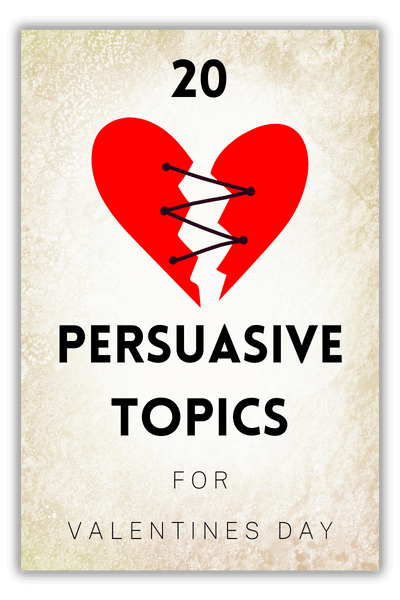Persuasive Topics for Valentines

Valentine's day has a turbulent and confusing history. Below is some history and five persuasive topics for Valentines that you can use in a debate, speech, or essay. To get your audience's attention and introduce the controversy, the speaker might start with a Valentine anecdote, an interesting fact, or a poem.
Roses are red, violets are blue,
I’ve got a sweetheart, and maybe you do.
But let’s be honest, it’s all just a game,
One big commercial holiday; what a shame.
Some of the earliest notions of the holiday are the roman festival Lupercalia. It was a festival from the 13th to the 15th of February. During the festival, a lottery matched prospective couples. The two would spend the festival together, and if the match succeeded, they would stay together. True Valentine's day was originally called Saint Valentine's day after the execution of two men on February 14 during the reign of Claudius ll. However, the more modern romanticism of the holiday was thanks to poets like Shakespeare and Chaucer, who showed a sweeter side to the holidays.
Nowadays, to some, the holiday is a symbol of showing love with expensive gifts and lavish dinners. While others may see it as a way to pay your way to another's heart. All this contentiousness around the holiday has made it a topic worth debating.
Top Five Persuasive Topics for Valentines
Valentine’s day is too commercialized
A popular example from the various persuasive topics for Valentine's day is the commercial aspect. Consumers have spent an incredible amount of money on Valentine's day in recent years.. In 2016 experts had speculated a total of 19.7 billion spent, and 1.1 billion of that was just on the cards. Which for so many people is a life-changing amount of money. However, the trend of commercialization of the holiday began in the 19th century when they began to print cards for the day, typically depicting Cupid and hearts.
Valentine's day is paternalistic
Another of the persuasive topics for Valentine's is the paternalistic nature of the holiday. In modern history, the event has emphasized that the men woo and take care of the women and treat them to a wonderful day. However, continuing this idea can be harmful. It can be harmful to stereotype men and women. It perpetuates that men must care for women, and the ladies don’t have to do anything. Even if they wanted to, so many commercialized products are marketed to them that it is hard to get a meaningful gift for their partner.
Valentine's day is non-inclusive
Valentine's day has been about how men can win over women with gifts and other trinkets for years, and with the larger acceptance of the LGBTQ+ community, one would think that the marketing demographic would have changed more by now to compensate for the introduction of the new market. However, this is quite the opposite. Many mainstream companies that make it big during the month of love have little inclusion for same-sex couples. Many matching gimmicks for “his” and “hers' ' mugs or pajamas don't have a same-sex option. So if a couple wanted these items, they would have to buy two of them and hand the others off to friends or even throw them away.
Valentine's day is a pagan holiday
As previously mentioned, some of the earliest mentions of “valentines day” were a roman festival called Lupercalia. The festival spanned from February 13-15, and they would sacrifice animals, and women would line up to be whipped with the pelts of the sacrifices. Believing doing so would promote fertility. Afterward, they would be paired off and spend the rest of the festival together. And if things went well, they would even stay together after.
Valentine's day is a Christian holiday
If presenting to an appropriate audience, the speaker may tackle the religion as a choice of the persuasive topics for Valentine's day. In terms of Valentines' relation to Christian beliefs, the history goes back to when the Romans still outlawed Christianity.There are lots of variations to the story of Saint Valentine. However, this one is a more popular version of the story. Supposedly there was a priest who was ministering to some faithful and was caught. He fell in love supposedly with the jailer's daughter and wrote her a note signing it with “your Valentine '' before his execution. However, specifics for the young woman are debated, whether she was the jailer's daughter or a blind woman healed by him. In the end, it was marked as a day to honor him and his faith in God, and thus, they made it a day to feast. As time passed, though, it slowly became more of what we know today.
For more information,"Daily Life in the Roman City" provides details about the history of the debate. For example, "When Christianity became dominant centuries later, the feast day of St. Valentine was set near this date in an effort to eradicate the earlier pagan holiday, although the earlier connection with fertility survived, transmuted into the current association of the day with romance."
Twenty Additional Persuasive Speech Topics for Valentines Day

- "The commercialization of Valentine's Day: Profit or love?"
- "The importance of expressing love every day, not just on Valentine's Day."
- "The impact of Valentine's Day on mental health: Is it always positive?"
- "Does Valentine's Day reinforce harmful relationship stereotypes?"
- "Valentine's Day around the world: A cross-cultural perspective."
- "Should Valentine's Day be celebrated in schools?"
- "The history of Valentine's Day: Its origins and how it has evolved over time."
- "The effect of social media on Valentine's Day expectations."
- "Valentine's Day - An opportunity to focus on self-love and self-care."
- "Is Valentine's Day a celebration of love or a marketing gimmick?"
- "Valentine's Day and eco-consciousness: Reducing waste and promoting sustainable gifting."
- "The significance of friendship on Valentine's Day."
- "Empowering singles on Valentine's Day: It's not just for couples."
- "The psychology behind the romance of Valentine's Day."
- "Exploring alternatives to traditional Valentine's Day celebrations."
- "Should Valentine's Day be expanded to include all forms of love, not just romantic love?"
- "The influence of Valentine's Day on the economy."
- "Gender roles and expectations on Valentine's Day."
- "The impact of Valentine's Day on the retail and hospitality industries."
- "Is Valentine's Day an inclusive holiday?"
No matter your view, it's easy to say that it is a great topic of interest, especially given the time of year. Valentine’s day gives ample ammunition to debates on the history and myths surrounding the holiday.
Best Speech Topics provides suggestions for both persuasive topics for Valentines, as well as other topics on holidays, such as how to speech topics.
Need a topic unrelated to Valentine's? Check out the list below.
A List of Other Interesting Persuasive Speech Topics
Persuasive speech topics are a great way to inspire a conversation and share thought-provoking ideas. By either using the list below or by using it to inspire your ideas, you should be able to tackle any persuasive speech assignment that comes your way. Keep this in mind while you read through these and when you come up with your own to use a topic appropriate for the space you're giving your speech in.
Also, if you're coming up with your speech topic, make sure that it is something that you can see has opposing sides to the argument. That way, when you give your speech, you can persuade someone in the audience to see your side of the argument. It also helps if you agree with the position you’re taking. However, either way is fine. Just know if it's a topic you have an issue with, being impartial with it may not be a good choice for you since you’ll need to give a brief mention to the other position as well.
List of Non-Valentine Persuasive Speech Topic Ideas
- Explaining why you should be for or against the death penalty
- Talking about if there is even a middle class in the US
- If there is truly climate change
- Is it really important for students to learn another language in school/
- Talk about why more people should play video games
- Persuade them to put a higher emphasis on history in school
- Explain that respect is earned and not given blindly
- Why people should be able to fly everywhere instead of driving
- Explain why banning books is bad for learning
- Explain why we should put a higher emphasis on mental health
- Elaborate on why offices should look less drab
- Tell why schools need to tell more about important life lessons
- Explain why the service industry needs more credit for the work they do
- Talk about why people don’t want to see the news anymore and how to fix it
- Explain why historical revisionism can be harmful
Click here for 60 additional "Good Persuasive Speech Topics."
Topics like the ones listed above are a great way to start getting your creativity flowing to try and get some of your own ideas down on paper. Remember that if you cannot think of your topic, there is nothing wrong with using the list above. Just ensure that no matter the topic, it's a good choice for your audience. Make sure you aren’t giving a speech to a group that wouldn't think the topic is irrelevant to them. In some cases finding a happy medium for your topic can prove difficult however, do not let that dissuade you from trying.
Regardless of that aspect, persuasive speeches are a fantastic way for orators to get someone to see their side of a particular issue and can potentially bridge gaps in understanding for the audience. Doing this can largely impact people's lives and perhaps even inspire them to make a change in areas some thought impossible.



